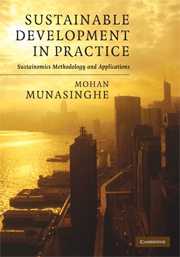Book contents
- Frontmatter
- Contents
- Foreword by James Gustave Speth
- Preface
- Part I Framework and fundamentals
- Part II Global and transnational applications
- Part III National and macroeconomic applications
- Part IV Sub-national sectoral and system applications
- 10 Energy-sector applications
- 11 Transport-sector applications
- 12 Water-resource applications
- 13 Ecological and agricultural system applications
- 14 Resource-pricing-policy applications
- Part V Project and local applications
- References
- Index
14 - Resource-pricing-policy applications
Published online by Cambridge University Press: 05 August 2012
- Frontmatter
- Contents
- Foreword by James Gustave Speth
- Preface
- Part I Framework and fundamentals
- Part II Global and transnational applications
- Part III National and macroeconomic applications
- Part IV Sub-national sectoral and system applications
- 10 Energy-sector applications
- 11 Transport-sector applications
- 12 Water-resource applications
- 13 Ecological and agricultural system applications
- 14 Resource-pricing-policy applications
- Part V Project and local applications
- References
- Index
Summary
This chapter concludes our focus on sub-national applications of sustainomics, by examining sustainable pricing of natural resources such as energy and water within a national economy. Both renewable and non-renewable resources are analysed. A practical and effective sustainable pricing policy (SPP) framework that meets national goals is developed and applied to energy, based on the sustainable energy development approach set out in Chapter 10. Price is most effective as a long-run policy tool, with two-edged implications for sustainable development. Prices are developed in two stages. Sections 14.1 to 14.3 use economic principles to determine strictly efficient prices based on marginal costs, which will lead to economically optimal production and consumption of energy. Environmental issues are included by valuing relevant impacts and externalities (see Chapter 3), and then incorporating the results in the economic analysis. Next, Section 14.4 shows how such efficient prices may be further adjusted to derive more sustainable and practical tariff structures that meet social goals such as affordability and basic needs of the poor, other objectives, such as regional or political considerations, and practical metering and billing constraints. Finally, in Section 14.5, we show how the SPP framework may be used for pricing of other natural resources such as water, and we discuss water-specific issues.
- Type
- Chapter
- Information
- Sustainable Development in PracticeSustainomics Methodology and Applications, pp. 460 - 500Publisher: Cambridge University PressPrint publication year: 2009



